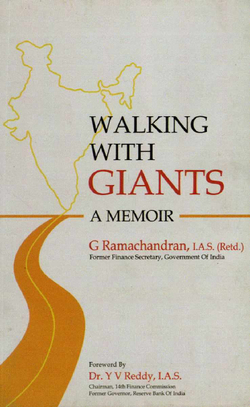"Walking with Giants" is a memoir by G. Ramachandran, a distinguished Indian Administrative Service (IAS) officer. The book provides a detailed account of his career, which spanned from his entry into the IAS in 1949 until his retirement as the Executive Director of the Asian Development Bank in 1985. The memoir offers insights into the workings of the Indian government, the intricacies of public administration, and the personalities of key political figures during a transformative period in India's history.
Ramachandran's memoir highlights the challenges and complexities of public administration in India. It covers his experiences working in various capacities, including as Finance Secretary of Tamil Nadu and later as Finance Secretary of India. His involvement in significant policy measures like bank nationalisation and poverty alleviation programs under Prime Minister Indira Gandhi's leadership is particularly noteworthy. The book provides an insider's view of the political dynamics and administrative decisions during the tenures of several prominent Indian leaders, such as Rajaji, Kamaraj, Annadurai, Indira Gandhi, Morarji Desai, and Charan Singh. Ramachandran reflects on the public perception versus the reality of these leaders, often highlighting their lesser-known traits and contributions.
Ramachandran's experiences shed light on the relationship between the central and state governments in India. His work with various Finance Commissions and his efforts to address the issues related to centrally sponsored schemes are significant aspects of this theme. The memoir discusses various economic policies and reforms implemented during Ramachandran's tenure. His role in formulating and implementing these policies, including his time during the Janata regime, is a critical component of the book.
Ramachandran explains his motivations for writing the memoir, influenced by his family's encouragement and his desire to document his career for future generations. The book covers Ramachandran's early life, education, and entry into the IAS, highlighting the transition from his village to the administrative hub of Delhi, marking the beginning of his long and illustrious career. He reflects on his initial years in the IAS, detailing his experiences and learnings that shaped his administrative philosophy and approach.
The memoir delves into his roles and responsibilities in the Secretariat, providing insights into the administrative machinery and the challenges faced by civil servants in executing their duties. Ramachandran discusses his time working with Chief Minister Kamaraj, focusing on the political and administrative changes during this period in Tamil Nadu. He shares his experiences as a District Collector in Coimbatore, highlighting the grassroots-level administration and the impact of government policies on local communities.
G. Ramachandran's memoir also provides insights into his interactions and observations of Chaudhary Charan Singh, a prominent Indian politician who served as the Prime Minister of India. During his tenure in various administrative roles, Ramachandran witnessed Charan Singh's influence on Indian politics, especially concerning agrarian reforms and the empowerment of farmers. Charan Singh's tenure and policies are significant parts of Ramachandran's narrative, illustrating the political landscape of the time. Ramachandran reflects on Charan Singh's dedication to agricultural development and rural upliftment, which align with his own administrative focus on land reforms and poverty alleviation. This connection between Ramachandran and Charan Singh highlights their shared commitment to addressing the challenges faced by India's agrarian sector and rural population.
Overall, "Walking with Giants" is a rich narrative that offers a comprehensive view of India's administrative and political landscape through the eyes of a dedicated civil servant. The memoir not only documents Ramachandran's professional journey but also provides valuable lessons on governance, leadership, and public service, with notable references to influential figures like Chaudhary Charan Singh.


